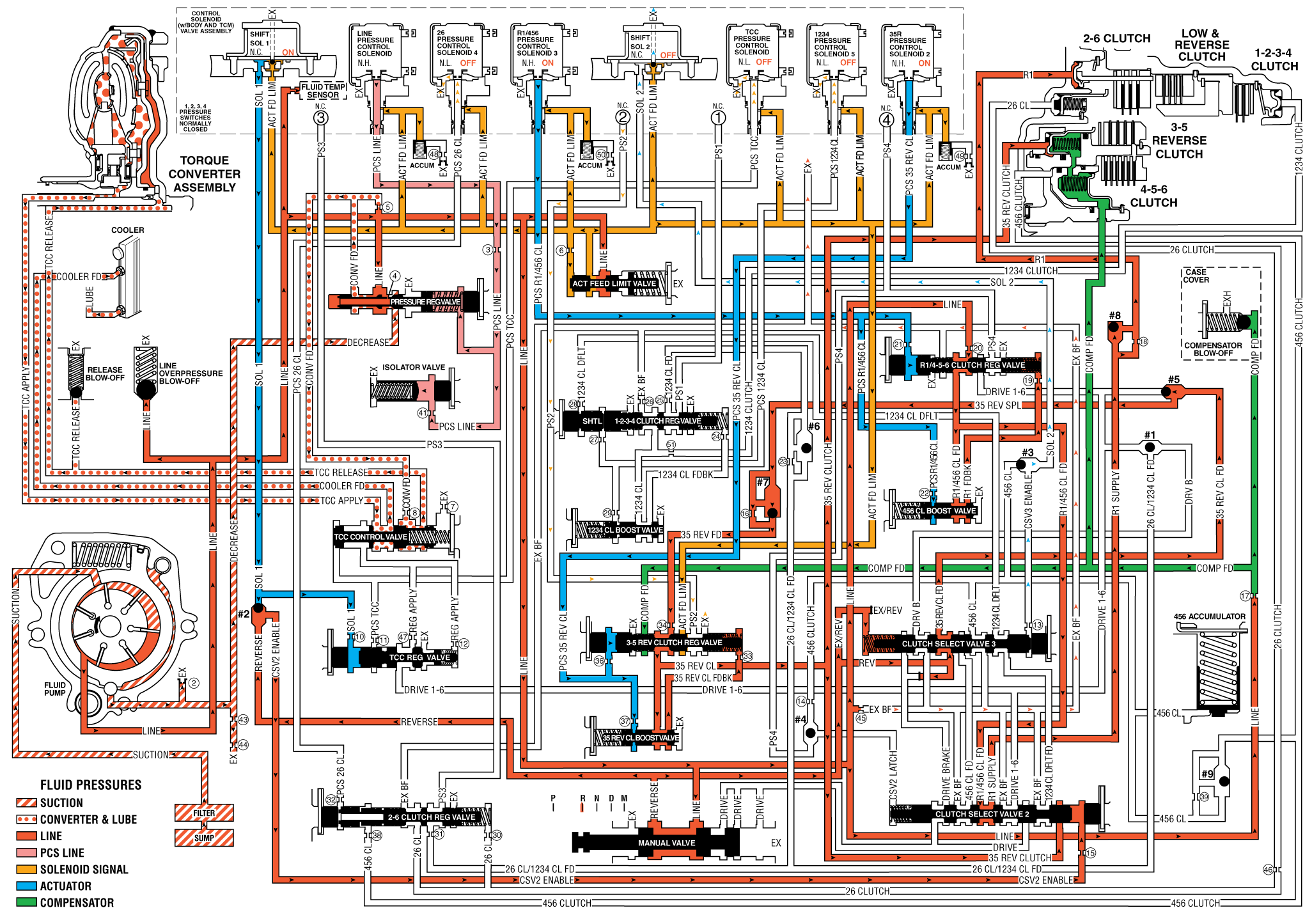When the gear selector lever is moved to the Reverse (R) position (from the Park position) the normally high 35R pressure control solenoid 2 is commanded ON and the following changes occur in the transmission’s hydraulic and electrical systems:
Fluid Pressure Directed in Preparation for a Shift
Manual Valve
With the manual valve in the reverse position, line pressure is directed into the reverse fluid circuit to the #2 ball check valve and clutch select valve 3.
#2 Ball Check Valve
Reverse fluid seats the #2 ball check valve against the solenoid 1 fluid passage and fluid is forced through orifice #15 into the CSV2 enable circuit.
Clutch Select Valve 2
CSV2 enable fluid, present at the valve from Park position, continues to hold the clutch select valve 2 against clutch select valve 2 spring force.
Low & Reverse Clutch Applies
Clutch Select Valve 3
Reverse fluid from the manual valve is routed to clutch select valve 3 to combine with clutch select valve 3 spring force to keep the valve in the off position. This allows reverse fluid to pass through the valve and enter the 3-5 clutch reverse feed circuit. The 3-5 clutch reverse feed fluid from the clutch select valve 3 is also routed to #5 ball check valve.
Low & Reverse Clutch
R1 supply fluid passes through orifice #18 and unseats check ball #8. R1 supply fluid enters the low & reverse clutch piston circuit and moves the piston against the spring force to apply the low & reverse clutch plates.
#5 Ball Check Valve
The 3-5 clutch reverse feed fluid seats #5 ball check valve against the drive 1-6 circuit allowing 3-5 clutch reverse feed fluid to enter the 3-5 reverse supply circuit. The 3-5 reverse supply fluid is then routed to #7 ball check valve and through orifice #16 where is enters the 3-5 reverse feed circuit. The 3-5 reverse feed passes through orifice #34 and then is routed to the 3-5 reverse clutch regulator valve.
3-5 Reverse Clutch Applies
35R Pressure Control Solenoid 2
The 35R pressure control solenoid 2 is energized (HIGH) allowing actuator feed limit fluid to enter the PCS 3-5 reverse clutch circuit. PCS 3-5 reverse clutch fluid is then routed through orifice #36 to the 3-5 reverse clutch regulator valve and through orifice #37 to the 3-5 reverse boost valve.
3-5 Reverse Clutch Regulator Valve
PCS 3-5 reverse clutch fluid moves the 3-5 reverse clutch regulator valve against 3-5 reverse clutch regulator valve spring force and 3-5 reverse clutch feedback fluid. This allows 3-5 reverse feed to pass through the valve and enter the 3-5 reverse clutch circuit. The 3-5 reverse clutch fluid is then routed to the 3-5 reverse clutch and the 3-5 reverse boost valve. PS2 fluid from pressure switch 2 exhausts through the valve allowing the switch to close.
3-5 Reverse Boost Valve
PCS 3-5 reverse clutch fluid pressure acts on a differential area moving the 3-5 reverse clutch boost valve against the 3-5 reverse clutch boost valve spring. The 3-5 reverse clutch fluid passes through the valve and enters the 3-5 reverse clutch feedback circuit. As PCS 3-5 reverse clutch fluid pressure is increased to a given value, the 3-5 reverse clutch boost valve opens the 3-5 reverse clutch feedback circuit to exhaust. This results in the 3-5 reverse clutch regulator valve moving to the full feed position sending full 3-5 clutch reverse feed pressure (full line pressure) to the clutch.
3-5 Reverse Clutch
The 3-5 reverse clutch fluid enters the 3-5R/456 clutch housing to move the piston against spring force and compensator feed fluid to apply the 3-5 reverse clutch plates.
Reverse

